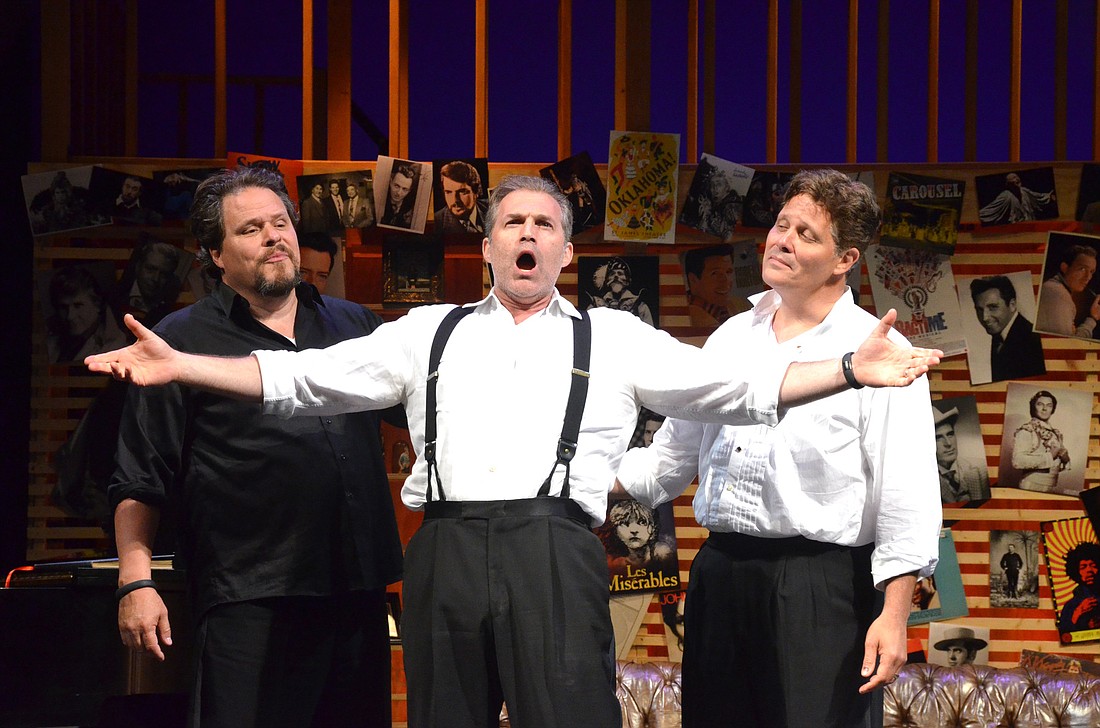- April 25, 2024
-
-
Loading

Loading

“Baritones Unbound” is making a joyful noise in the latest Asolo Rep production.
The baritones in question: Broadway heavyweight Marc Kudisch and opera contenders Mark Delavan and Jeff Matsey — fine singers, all. We’ll get back to them in a minute but, first, let’s deal with the title …
“Baritones Unbound.”
The title begs a question we can’t ignore: What is a baritone?
Well, according to the public domain authority of The Encyclopedia Britannica, “A baritone is a type of classical male singing voice whose vocal range lies between the bass and the tenor voice types. It is the most common male voice.”
“Most common?” To Kudisch, the chief creator of this musical history lesson, those are fighting words. And being defined as the vocal range between two other vocal ranges? He didn’t care for that either. (Attentive readers will note: He is a part of the baritonal trio.) This revue is Kudisch’s considered response.
Though “revue” doesn’t hit the nail on the head.
It’s a “greatest hits” compendium of baritone brio, true. But it’s also — shamelessly — trying to make you root for the baritone team. Director David Dower and Musical Director Timothy Swain pull out all the stops and do exactly that — creating a sonic wall of pure persuasion. (OK, guys, you win. Go baritones!) On top of that, it’s also a captivating aural history lesson.
The first act unfolds in an all-purpose Baroque waiting room: its digital walls flashing images of composers and translations as the music demands (excellent production design by Alexander V. Nichols). The vocal action kicks off in the Dark Ages and takes us up to the invention (or reinvention) of polyphony and harmony at the dawn of the Renaissance. It’s all church music, up to that point. But commedia dell’arte performers quickly steal the churchy style and take it to the streets. Somewhere along the line, the emerging form of opera buffa steals it back and gradually starts taking itself more and more seriously, until buffoonish opera finally morphs into opera seria. The trio of baritones illustrates these transformations with operatic snippets ranging from Mozart’s “The Magic Flute” to Rossini’s “Figaro.” Before long, Gilbert and Sullivan get into the act. In Darwinian fashion, their comic operas give birth to another mutation: musical theater — with Hammerstein and Kern’s “Showboat” getting credit for the launch. (Although Paul Robeson gets a nod for his soulful “Old Man River.”)
The second act takes us into a contemporary man cave, resounding with the vocal stylings of Bing Crosby, Frank Sinatra, Robert Goulet and, yes, Elvis (not flat-out imitations, but loving homage). We discover (via multiple examples) that Stephen Sondheim truly digs the baritone voice. But, for reasons unknown, sometime in the early Clinton era, Sondheim winds up in a pop music minority — as baritones fall from the pop charts and high-voiced male singers rise. Why?
Here, Kudisch opens it up for audience input. “Name a contemporary Broadway musical with a popular baritone aria,” he demands. After much mumbling, the answers return: “Les Miserables” and “Ragtime.”
That’s about it.
As Kudisch points out, “The age of the castrato has returned.”
But have no fear.
This uncommon performance of the common man’s voice electrified all ears. Like wide ties and sideburns, each scorned style eventually returns in heroic force. Judging by this revue, the baritone is due for a comeback.
If Kudisch and company have any say in the matter, now would be a good time.
They’ve made their voices heard.
IF YOU GO
“Baritones Unbound” runs through June 29, at the FSU Center for the Performing Arts, 5555 N. Tamiami Trail, Sarasota. Call 351-8000 or visit asolorep.org for more information.